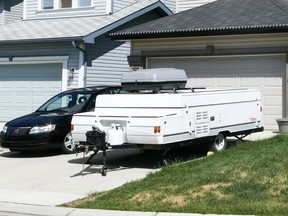The proposed changes would allow residents to park their RVs in the driveway from mid-May to mid-September, during the outdoor camping season.

Article content
Members of a city committee narrowly rejected a proposal to allow RVs to park in front of homes during the camping season, but a final decision on recommended changes will be made at a future city council meeting.
Community development committee members voted 5-6 Wednesday against staff’s recommendation to amend the city’s community standards bylaw, allowing recreational vehicles to park in a residential driveway in front of May 15-May 15. September.
Advertisement 2
Article content
Article content
In favor of the proposal were councilors Gian-Carlo Carra, Dan McLean, Jasmine Mian, Kourtney Penner and Courtney Walcott.
Councilors Andre Chabot, Peter Demong, Sonya Sharp, Richard Pootmans, Terry Wong and Raj Dhaliwal voted against.
After the failed vote, Mian made a motion to give council the final say on approving the changes. That motion passed 6-5.
“If it were up to the committee, this conversation would be over, but the fact is that we now have time to go and talk to our residents, hear what they think and ultimately make the final decision at council,” Mian told the journalists after the meeting. .
Currently, Calgarians can park their RV in the driveway or curb for up to 36 hours at a time, year-round.
Under the proposal, Calgarians would be able to park a motor home in their driveway 24/7, as long as the vehicle is at least one meter from the curb.

The amendment also stipulates that RV owners on corner lots would have to respect distances of 7.5 meters from the corner of the sidewalk to reduce line of sight problems.
Parking an RV in driveways would be prohibited for the rest of the year, except for loading or unloading purposes.
Article content
Advertisement 3
Article content
The rule changes only apply to RVs parked in driveways.
Mian said the changes “strike a balance” and would potentially save RV owners hundreds of dollars a year in storage costs.
“When we think about how to drive affordability for people, we don’t always think about the tax rate,” he said. “Sometimes it’s in the rules we set.”
Chabot disagreed, saying most Calgarians who own an RV can probably already afford to store it.
The new rules could present other problems, he argued, such as people illegally living in RVs parked in driveways.
“For the number of complaints we’re getting, changing this just to accommodate a few, to me, is not the right way to go,” Chabot said.
The city receives approximately 300 complaints annually about improper RV parking, according to Greg Pastirik, business strategist on the city’s policy and bylaw development team.
He said just under a fifth of Calgary households own a motor home, which includes motor homes, trailers, boats and other recreational vehicles.
Demong was one of the most vocal opponents of the proposed changes. He worries they will lead to more disputes between neighbors, particularly in newer suburban communities with smaller distances between driveways.
Advertisement 4
Article content
The District 14 representative told staff he was “vehemently” against the proposal, warning that the changes would “bother the bear” by creating more conflict.
“We’re allowing RV owners to have a lot more discretion, but at the expense of other neighbors and their sight lines and vantage points,” he said.
“Is this okay with you?”
Dhaliwal said there was “no empirical evidence” to suggest the public wanted the rules changed.
“Is it really worth doing if we don’t have a real majority saying they want it?” she asked.
During a lengthy discussion about proper procedure, Sharp asked what the purpose of having the committees vote is, if their verdict can be made moot by a motion to send the failed article to the council for consideration.
Mian responded that it should be the council’s responsibility to consider controversial decisions that affect the entire city.
“The council is the final body to make all decisions,” he said. “We consider what a committee says, but it is not the final body. If that were the case, only half of the councilors would be allowed to make decisions on behalf of the entire city, and that is not right.”
Article content
